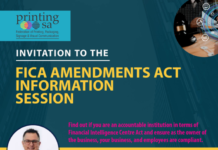Printing SA hosted a Financial Intelligence Centre Act (FICA) Amendments Act information session. Attendees could find out if they are an accountable institution in terms of FICA and ensure the owner/s of the business, their business and employees are compliant.
Ulrik Strandvik from Gunston Strandvik Mlambo (GSM) Attorneys helped to unpack the legislative obligations as it can be difficult to navigate continuously changing policies.
It is important to ensure that businesses:
– Have the necessary legal agreements and policies in place for handling personal and/or sensitive information that may be collected to ensure compliance with FICA.
– Have the proper training to ensure adequate and efficient collection, identification, verification and storage of the documents which allow for compliance with FICA obligations.
It is therefore important to consider the policy implications of such obligations to your business and to obtain legal assistance in respect of the interpretation and implementation of obligations to ensure compliance.
In 2023, South Africa was greylisted by financial crime watchdog, the Financial Action Task Force (FATF), for not fully complying with international standards concerning the prevention of money laundering, terrorist financing and proliferation financing.
During the session, Strandvik emphasised that the purpose of FICA is to prevent money laundering, terrorist activities, identity theft, fraud and proliferation financing. South Africa has been greylisted because money launderers will target the country as the FICA laws aren’t strong enough, and there are a lack of convictions.
It is therefore important to identify the nature of your business and your clients, and whether your business is accountable.
Traditionally attorneys, banks, casinos, estate agents and stockbrokers are accountable, but the list has been broadened to include administrators of trusts (including formation of trusts, foreign exchange companies, company secretarial businesses, suppliers of high value goods, providers of credit, crypto assest businesses and clearing system participants.
Suppliers of high value goods include businesses dealing in high value goods where such business receives payment in any form to the value of R100000 or more, and includes payment in instillments/ components that come to the value of R100000 where those payments are linked to a larger contract/supply. ‘High value goods’ means any item that is valued in that business at R100000 or more.
A credit provider can be a person who carries on the business of a credit provider as defined in the National Credit Act (NCA).
A person who carries on the business of providing credit where agreement is excluded from the application of the NCA virtue section 4 (1) (a) or (b) of the Act.
A credit provider includes some one that provides incidental credit agreement, i.e a fee or charge is due for any late payment, or parties can enter into an early settlement discount.
Exclusions and exceptions from the NCA include when the consumer is a juristic person with an annual turnover asset value of R2 million or more, the state, an organ of the state, or involving a large transaction (a mortgage bond and agreements above the threshold). So there are exceptions and exclusions in terms of NCA depending on the nature of the consumer, however in terms of the FICA amendments you are now an accountable institution, and the requirement is to comply and be FICA’d.
If you have an incidental credit agreement with Printing SA, you fall under the FICA act. The only way around it is if you don’t charge interest for late payment, or provide credit line interest free (not ideal at all as there are your own creditors to pay).
The incidental credit provision could obviously impact some of Printing SA members, looking at the Credit Agreement template drafted by Printing SA for the members to use that is a typical example of incidental credit provision. A way to get around the provision would be simply to not charge late payment interest and, where necessary, to amend the terms and conditions of trade contained in the credit application forms, to avoid the requirements of FICA to register with the Financial Intelligence Centre. However due to the nature of business, as you will like to extend credit to your customers, and it may be difficult to implement new provision, the Gunston Stranvik Mlambo attorneys will be able to assist you on how to comply.
Obligations as an accountable institution include compiling a risk management compliance programme, identifying and verifying clients/parties as per the risk matrix in your programme, reporting to the FICA centre, training your staff, keeping records, and completing and submitting risk and compliance return.
In terms of customer due dilliegence, it is important to understand your client’s business, and their source of wealth/funds, understand beneficial ownership, and monitor transactions throughout the relationship, while keeping up to date. It is also very important to be careful with who you do business, be it domestic or foreign (e.g the Guptas).
Strandvik finished off in stating that FICA is not here to ruin your business, but to make you aware of fraudulent behaviour. He emphaised that a business should register on the FICA website, and report suspicious behaviour, because reporting covers your business, and also doesn’t necessarily mean you are reporting anything suspicious. There are organisations such as GMS that can help you compile your report.
The webinar concluded with a Q&A session.
PRINTING SA
+27 11 287 1160
info@printingsa.org
http://www.printingsa.org












